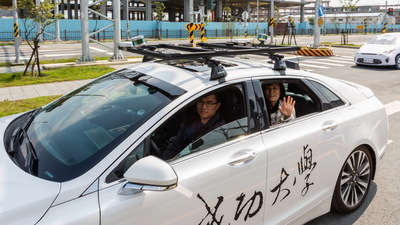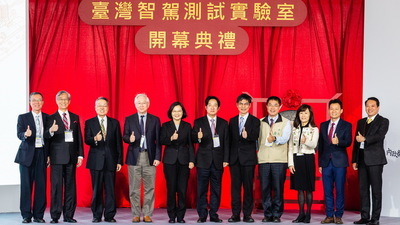Taiwan’s First CAR Lab Opens – NCKU’s Connected and Autonomous Vehicle Passes Dynamic Test with Flying Colors


Connected and autonomous vehicles are being actively developed around the world in hopes of creating vehicles that can instantly make the safest and most appropriate responses to ever-changing road environments and realizing the dream of self-driving cars. In Shalun, Tainan, the Ministry of Science and Technology built the Taiwan CAR (connected, autonomous, road-test) Lab, a closed testing ground and the first of its kind to incorporate the complex traffic environments often seen in the Asia-Pacific region. President Tsai Ing-Wen presided over the opening ceremony on February 25. A dynamic test of a self-driving car developed by NCKU at the ceremony presented perfect performance: stopping at red lights, moving forward at green lights, making turns smoothly, and going around or stopping before obstacles. The results give rise to more imagination and expectations for smart transportation in the future.
The Taiwan CAR Lab has 13 hardware road facilities, such as intersections and pedestrian crossing, and NCKU’s connected autonomous vehicle research team assists in e stablishing various test scenarios that can be integrated with physical tests. NCKU president Dr. Huey-Jen Jenny Su took a ride in the self-driving car developed by NCKU at the opening ceremony. She praised the car for its responses and decision-making and was very satisfied with how smooth the drive was. A number of other ceremony attendees also got to get an early experience of the future world that technology will bring.
The Taiwan Car Lab will initially be managed and operated by the National Applied Research Laboratories (NARL) and the Automotive Research and Testing Center. NCKU president Dr. Huey-Jen Jenny Su and NARL president Yeong-Her Wang signed a collaboration agreement to promote the research and development of verification venues for self-driving vehicles and create a comprehensive traffic detection system.
Dr. Huey-Jen Jenny Su pointed out that NCKU will play a key role in Taiwan’s first connected and automated vehicle testing lab and that their collaboration with NARL will have a synergetic effect which will help them realize society’s AI dreams earlier. The development of new technology will spur progress in new industries and contribute to Taiwan’s smart economy. Yeong-Her Wang stated that connected automated vehicles must undergo stringent testing and will require the integration of NCKU’s technology and energy in electrical engineering, information technology, mechanical engineering, and even management.
NCKU developed the crucial software for connected and automated driving in 2017 and created a prototype that uses technologies such as navigation and positioning, environment sensing, decision-making and planning, and drive control. Communication devices are also installed in the vehicle to provide feedback on vehicle status and enable remote control based on certain procedures when necessary. Autonomous driving can be divided into 5 levels, with level 5 being the highest. At present, NCKU’s autonomous vehicle possesses level 4 autonomous driving capabilities and can drive around campus.
For autonomous vehicles to drive safely on the road, they require the complete integration of technologies in three fields: sensing, decision-making, and control. Complete testing and verification is a necessary process that autonomous vehicles must undergo before they can drive safely on the road and an indispensable part of autonomous vehicle development in Taiwan.
The Taiwan CAR Lab has 13 hardware road facilities, such as intersections and pedestrian crossing, and NCKU’s connected autonomous vehicle research team assists in e stablishing various test scenarios that can be integrated with physical tests. NCKU president Dr. Huey-Jen Jenny Su took a ride in the self-driving car developed by NCKU at the opening ceremony. She praised the car for its responses and decision-making and was very satisfied with how smooth the drive was. A number of other ceremony attendees also got to get an early experience of the future world that technology will bring.
The Taiwan Car Lab will initially be managed and operated by the National Applied Research Laboratories (NARL) and the Automotive Research and Testing Center. NCKU president Dr. Huey-Jen Jenny Su and NARL president Yeong-Her Wang signed a collaboration agreement to promote the research and development of verification venues for self-driving vehicles and create a comprehensive traffic detection system.
Dr. Huey-Jen Jenny Su pointed out that NCKU will play a key role in Taiwan’s first connected and automated vehicle testing lab and that their collaboration with NARL will have a synergetic effect which will help them realize society’s AI dreams earlier. The development of new technology will spur progress in new industries and contribute to Taiwan’s smart economy. Yeong-Her Wang stated that connected automated vehicles must undergo stringent testing and will require the integration of NCKU’s technology and energy in electrical engineering, information technology, mechanical engineering, and even management.
NCKU developed the crucial software for connected and automated driving in 2017 and created a prototype that uses technologies such as navigation and positioning, environment sensing, decision-making and planning, and drive control. Communication devices are also installed in the vehicle to provide feedback on vehicle status and enable remote control based on certain procedures when necessary. Autonomous driving can be divided into 5 levels, with level 5 being the highest. At present, NCKU’s autonomous vehicle possesses level 4 autonomous driving capabilities and can drive around campus.
For autonomous vehicles to drive safely on the road, they require the complete integration of technologies in three fields: sensing, decision-making, and control. Complete testing and verification is a necessary process that autonomous vehicles must undergo before they can drive safely on the road and an indispensable part of autonomous vehicle development in Taiwan.
Provider:
News Center
Date:
2019-03-12




